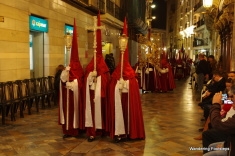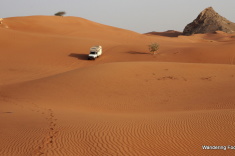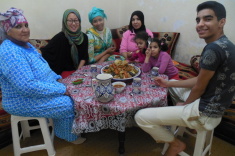(Author’s Note: This blog entry wasn’t easy to post. Internet in Ethiopia is hard to find, unreliable, and incredibly slow. In fact, I’ve just been able to post this after four days of the internet being down in an entire sector of Addis Ababa, Ethiopia’s capital! I guess telecommunications is just one of the many challenges of travel in Ethiopia.)
I didn’t want to start my Ethiopia blog entries on a negative note. I reflected, for over a week, on how I could weave my Ethiopian experiences thus far into an upbeat entry. I even contemplated fast-forwarding the narrative of my time here and leaving this blog entry for later on.
But then I realized that sharing the challenges I’ve faced in Ethiopia right from the start is the honest way of portraying my experience here. Perhaps it will help warn and prepare future travelers to Ethiopia. And maybe – just maybe – if I share my challenges now, throwing them out into the blog-iverse, I will be able to let them go.
It all started at the border. We’d made good time on the Marsabit-Moyale road and decided to cross into Ethiopia that afternoon. Our Lonely Planet guide had described a certain lodge on the Ethiopian side of the border as the “best on either side.”
When I saw the toilet I would be expected to use that night, my first thought was, “This is the best in town?” My second thought was that there was no way I’d be doing my morning business in there. And my third thought was that Ethiopia was going to be tough.
I won’t disturb the gentle sensibilities of my readers by describing the appearance or smell of that evening’s toilet. I will simply say that, though this was the worst of the bunch so far, that toilet was a sort of symbol representing the general standard of cleanliness of Ethiopia and its establishments.
.jpg)
Entering Ethiopia. Looks promising, no?
I had to learn very quickly to lower my campsite standards. I can’t even really say “campsite,” for a campsite is a rarity in Ethiopia. Most of the time, we’ve slept in the parking lot of hotels and lodges, and been given permission to use the staff toilets and showers. (Once again, I will not describe those.) And so, now, a good place to stay is a piece of grass far-ish from the road with a clean-enough toilet and a bit of cold running water for a shower. Forget internet, forget hot water or sinks for washing dishes. Forget bathrooms decorated Afro-chic. Forget large shaded campsites with individual electrical plugs.
Just give me a place that’s not a parking lot on the side of the highway with a squat toilet from hell and I’ll be happy. I’ll even stay two nights.
And so, Bruno and I have found ourselves on the road a lot, in perpetual search of a comfortable night’s sleep. Admittedly, the roads have improved since Bruno was last here (in 2000). Tar does make the driving easier. But in Ethiopia, more than in any other country, animals pose a serious hazard to vehicles. I have never seen so many cows, donkeys, and goats on the side of the road. It seems the Ethiopian government tarred the roads, in fact, for the livestock of the country, rather than the vehicles. At least that’s what the locals think – they spread their beasts of burden along the entire width of the road, and merely make last-ditch, half-hearted attempts to move them when our vehicle appears on the horizon. Most of the time, it’s the front tip of Totoyaya that pushes the animals to the roadside.
.jpg)
Ethiopian traffic jam!
.jpg)
The main mode of transportation on the roads of Ethiopia.

The roads in Ethiopia are not usually this pock-marked.
Because we’re driving so much more than usual – once six days in a row, a new record by far – we are much more tired than usual. And so, we are finding it difficult to deal with the Ethiopian people, themselves.
Our first day driving in Southern Ethiopia, we saw a child perform a jig on the side of the road. I laughed. Bruno honked the horn. A few kilometers later, another few children danced as we passed by. Someone did the splits. Another did a hand stand. By the time we reached Konso, we were being bombarded by cartwheels and booty-shakes, followed inevitably by car-chases and upturned palms.
We discovered that the children in this region had learned to perform for vehicles full of farenji, or foreigners (read: white tourists). They dance for money or pens, of course, but they also dance for empty water bottles. Stuffing the empty bottles with a bread made of maize, the children ferment the concoction until it’s a filling, alcoholic porridge-like beverage. Sounds healthy.

This is a dance? It looks like he’s posessed…

One of the few Ethiopian children NOT to dance or throw rocks our way.
“At least they’re not throwing rocks at us,” I commented to Bruno as we drove to Arba Minch. I’d heard from many sources that children in Ethiopia are known to throw rocks at passing farenji vehicles. They’d shattered windows and even injured people. When Bruno came to Ethiopia on his motorbike, he had bruises all over his arms from the rocks.
But I guess I spoke too soon. Because a few days later, as we drove north out of Arba Minch, the stones began to be hurled our way. They haven’t been large – so far – but having a rock thrown at oneself by a local person in a country where we are a guest is a horrifying, demeaning feeling.
Being spat on is even more demeaning. And that is exactly what happened in Arba Minch’s local market. I was shopping for produce, trying to bargain with ladies who spoke no English. (This was before I decided to learn a bit of Amharic, the local language, which is incredibly difficult. Can you believe their word for “thank you” has six syllables?) We were acquiring quite a crowd, which I’d already become used to in Ethiopia, so I took little notice of the fact that the children were signalling that we give them some of our purchases. When I turned to leave the market, they yelled at us, and one spit at our feet.
I was beginning to dislike the children of Ethiopia.
And unfortunately, in Dorze, a hilltop village north of Arba Minch, it wasn’t just the children harassing us. The adults, too, held out their hands, bellowed “You! You! You!” at us, and jumped in front of our vehicle to force us to pull into their shop. This was a far cry from the relaxed, positive cultural experience the Lonely Planet had described. It was so bad, in fact, that we decided to turn around and head back down the hill. We would only see the famous beehive woven huts of Dorze village from the car window.

On the way up the hill to Dorze.

The beehive-shaped huts of Dorze.
Don’t get me wrong. Ethiopia hasn’t all been bad. There have been pleasant surprises, too. The countryside is beautifully lush and fertile, verdant hills and Rift Valley lakes around every twist in the road. I can actually buy fruit and vegetables, contrary to how things were a decade ago and to what I’d been expecting. The villages are filled with unique sights – traditional coffee stands, women with strange center-parted braids, families riding aboard donkey-drawn carriages. We’ve found two “campsites” where we were actually able to stay more than a night (Swayne’s Hotel in Arba Minch, and Karkaro Beach Cottages at Lake Langano). And some of the children we’ve met have approached us first to shake our hands or practice English before asking us for a gift.

The stunning view of Nechisar National Park from Swayne’s Hotel.

Lake Langano, and our campsite, Karkaro Beach Cottages.

All the women sporting interesting center-braided hairdos.
And for every challenge we face, I tell myself, there will be a like reward. We are, after all, in a country like no other in Africa. A country with an absolutely unique history, religion, written script, music, calendar, and food. A country with vast rewards to offer those who have the perseverance to look past its challenges.
It’s just that, whenever I arrive at a new “campsite” and look at the toilet, I wonder if I have the patience to try.



Leslie Brown - Amazing story, I suppose Irving Oil could set up a “BIG STOP” with little competition around there.
You two certainly have courage to see this part of Africa. Take care..
Love Grampa
Brittany - Thank you for your words of encouragement, Grampa! We are living the life – it isn’t always easy, but I still appreciate it my luck every single day!